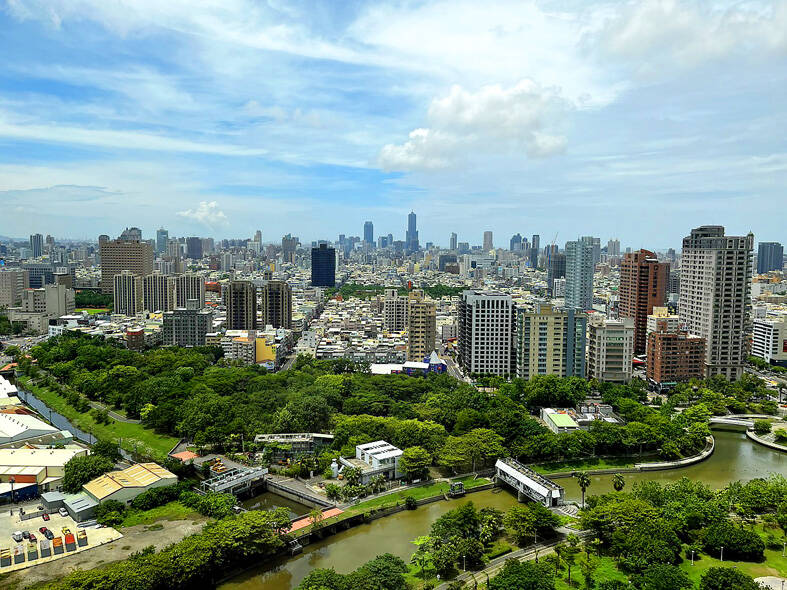Property transactions in the nation’s six special municipalities last month totaled 19,876 units, up 7.6 percent from a year earlier, as real demand held resilient, especially among first-home buyers, analysts said on Wednesday.
The volume represented a mild 2.4 percent decline when compared with a month earlier based on data from Taipei, New Taipei City, Taoyuan, Taichung, Tainan and Kaohsiung, they said.
“Buyers with real demand quit staying on the side lines and took action after waves of unfavorable policy measures failed to trigger price corrections,” Great Home Realty Co (大家房屋) head researcher Mandy Lang (郎美囡) said, referring to the central bank’s selective credit controls on local lenders, the government’s ban on the transfers of presale housing contracts and upcoming property tax increases.

Photo: Hsu Yi-ping, Taipei Times
The recovery was most evident in Taoyuan, Taichung and Kaohsiung, where the number of deals increased 9 percent, 12.4 percent and 17.4 percent from a year earlier to 3,857, 3,880 and 3,146 units respectively, Lang said, adding that transactions in New Taipei City grew 4.1 percent year-on-year to 4,891 units.
Taipei and Tainan bucked the uptrend as their transactions slipped 0.2 percent and 0.1 percent to 2,268 and 1,834 units respectively, according to data on the separate local government’s Web sites.
The signs of stabilization failed to extend to Taipei because house prices in the capital have grown beyond the reach of first-home buyers, Lang said.
Sinyi Realty Inc (信義房屋) shared similar observations, pointing out that first-home buyers contributed more than 50 percent of last month’s transactions and houses valued between NT$7 million and NT$20 million (US$221,344 and US$632,411) accounted for 60 percent of the total.
House prices within budget sit at the top of the list of concerns among first-home buyers, instead of popular locations, Sinyi research manager Tseng Ching-der (曾敬德) said.
The phenomenon explained why small apartments have been the mainstream product, he said.
H&B Realty Co (住商不動產) research chief Jessica Hsu (徐佳馨) said the government lent support by rolling out a new home loan program that offers interest rates of 1.775 percent on mortgages for first-home buyers.
The program comes with a loan limit of NT$10 million, a grace period of five years and a mortgage duration of 40 years, significantly lowering the thresholds of owning homes for young people, Hsu said.
The favorable lending terms would drive people to buy homes with rents increasing, she said.

Intel Corp chief executive officer Lip-Bu Tan (陳立武) is expected to meet with Taiwanese suppliers next month in conjunction with the opening of the Computex Taipei trade show, supply chain sources said on Monday. The visit, the first for Tan to Taiwan since assuming his new post last month, would be aimed at enhancing Intel’s ties with suppliers in Taiwan as he attempts to help turn around the struggling US chipmaker, the sources said. Tan is to hold a banquet to celebrate Intel’s 40-year presence in Taiwan before Computex opens on May 20 and invite dozens of Taiwanese suppliers to exchange views

Application-specific integrated circuit designer Faraday Technology Corp (智原) yesterday said that although revenue this quarter would decline 30 percent from last quarter, it retained its full-year forecast of revenue growth of 100 percent. The company attributed the quarterly drop to a slowdown in customers’ production of chips using Faraday’s advanced packaging technology. The company is still confident about its revenue growth this year, given its strong “design-win” — or the projects it won to help customers design their chips, Faraday president Steve Wang (王國雍) told an online earnings conference. “The design-win this year is better than we expected. We believe we will win

Chizuko Kimura has become the first female sushi chef in the world to win a Michelin star, fulfilling a promise she made to her dying husband to continue his legacy. The 54-year-old Japanese chef regained the Michelin star her late husband, Shunei Kimura, won three years ago for their Sushi Shunei restaurant in Paris. For Shunei Kimura, the star was a dream come true. However, the joy was short-lived. He died from cancer just three months later in June 2022. He was 65. The following year, the restaurant in the heart of Montmartre lost its star rating. Chizuko Kimura insisted that the new star is still down

While China’s leaders use their economic and political might to fight US President Donald Trump’s trade war “to the end,” its army of social media soldiers are embarking on a more humorous campaign online. Trump’s tariff blitz has seen Washington and Beijing impose eye-watering duties on imports from the other, fanning a standoff between the economic superpowers that has sparked global recession fears and sent markets into a tailspin. Trump says his policy is a response to years of being “ripped off” by other countries and aims to bring manufacturing to the US, forcing companies to employ US workers. However, China’s online warriors